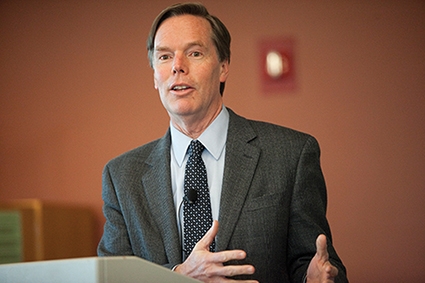Future NATO – Restoring Power and Purpose
As NATO leaders head to Warsaw, international security analysts say the Alliance faces its most complex challenges since the end of the Cold War. With the Brexit referendum, migration, and refugee crisis, “the Alliance faces the greatest threat to peace and security in Europe” reads the Atlantic Council’s report ‘Restoring the Power & Purpose of the NATO Alliance.’
We spoke with the authors of that report, Former US Ambassador to NATO, Nicholas Burns, and Former Commander of US European Command, General James Jones, on NATO’s future role, threats facing Europe’s Eastern Frontier and Brexit implications on Euro-Atlantic aspirant Georgia.
In light of Britain’s historic Brexit vote, transatlantic leaders are discussing what allies must do to bolster NATO’s strength and solidarity. The study is premised on the belief that the Alliance is facing its greatest challenges and calls for renewed leadership by the United States and key allies to restore NATO’s power and purpose.
“Transatlantic leaders must confront a jarring reality: the peace, security, and democratic stability of Europe can no longer be taken for granted,” reads the report, which goes on to outline four fundamental strategic challenges – “a revanchist Russia, eroding stability in the greater Middle East, a weakened European Union, and uncertain American and European leadership.”
When asked how Brexit might effect NATO, General James Jones says it is too early to tell, but “I think in a way it will help, it will focus people on NATO a little bit more, and, hopefully, if it focuses on the need for NATO and the EU to find a common ground politically, we can be more efficient, more rapid in the way we make decisions and execute them.”
According to General Jones, Britain’s historic vote to leave the European Union “should probably not have too much of an impact” on countries with Euro-Atlantic aspirations like Georgia and Ukraine as “we have to wait on that a little more anyway.”
For Former Ambassador Nicholas Burns, former US Envoy to NATO and Board Director at the Atlantic Council, Brexit showed how the Kremlin, in its propaganda campaign, is trying to divide Europe. “There is no doubt about it,” he says, quickly adding that he is optimistic about the future of Europe. “I sense that Germans are very formally attached to the European Union, the Dutch are attached, the Italians, the Spanish, the Belgians are attached; these are core countries that deeply believe in Europe, so I don’t think the sky is falling- we are not going to see a rush to exit.”
Speaking about specific implications of Brexit, Burns said it will effect NATO if “countries will not be capable militarily.” That is why, he adds, it is important for European countries of NATO “to enhance their defense spending by a significant amount.”
In the report which calls for renewed leadership by the United States and key allies to restore NATO’s power and purpose in the face of an entirely new security environment, the authors propose Alliance leaders agree much more ambitious measures to rebuild the Alliance. For which, the authors believe, NATO allies should build up NATO’s military presence in the Baltic States, Poland, and Black Sea region; commit to greater military spending among NATO allies; keep the pressure on Moscow; and restore strong American leadership.
NATO members and allies will meet in Warsaw in a dramatically changed security landscape, the report authors claim. There, NATO allies should “reaffirm their commitment to maintaining sanctions on Russia over its egregious violations of Ukrainian sovereignty,” as well as transferring long-requested lethal defensive armaments.
The Warsaw Summit is not an enlargement summit, though Montenegro has officially received invitation to join the Alliance. We asked Former Ambassador Burns what the chances are for Georgia, to which he replied: “It is very important that we not allow president Putin to veto any country from membership. He should not be able to veto Georgia; he should not be able to veto Ukraine. There is a long road to go for membership for those two countries, because of the problems within them. But they are partner countries and I think that will be the future.”
Read the story in Georgian at http://www.amerikiskhma.com/a/future-nato/3399101.html
Nana Sajaia, Voice of America Georgian Service












